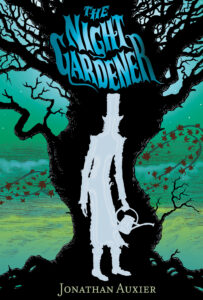Review of the Day: The Night Gardener by Jonathan Auxier
 The Night Gardener
The Night Gardener
By Jonathan Auxier
Illustrated by Patrick Arrasmith
Amulet Books (an imprint of Abrams)
$16.95
ISBN: 978-1-4197-1144-2
Ages 10 and up
On shelves May 20th
For whatever reason, 2014 is a dark year in children’s middle grade fiction. I speak from experience. Fantasy in particular has been steeped in a kind of thoughtful darkness, from The Glass Sentence and The Thickety to The Riverman and Twelve Minutes to Midnight with varying levels of success. And though none would contest the fact that they are creepy, only Jonathan Auxier’s The Night Gardener has had the chutzpah to actually write, “A Scary Story” on its title pages as a kind of thoughtful dare. A relatively new middle grade author, still young in the field, reading this book it’s hard to reconcile it with Auxier’s previous novel Peter Nimble and His Fantastic Eyes. It is almost as if Mr. Auxier took his whimsy, pulled out a long sharp stick, and stabbed it repeatedly in the heart and left it to die in the snow so as to give us a sublimely horrific little novel. Long story short this novel is Little Shop of Horrors meets The Secret Garden. I hope I’m not giving too much away by saying that. Even if I am, I regret nothing. Here we have a book that ostensibly gives us an old-fashioned tale worthy of Edgar Allan Poe, but that steeps it in a serious and thought provoking discussion of the roles of both lies and stories when you’re facing difficulties in your life. Madcap brilliant.
Molly and Kip are driving a fish cart, pulled by a horse named Galileo, to their deaths. That’s what everyone’s been telling them anyway. Living without parents, Molly sees herself as her brother’s guardian and is intent upon finding a safe place for the both of them. When she’s hired to work as a servant at the mysterious Windsor estate she thinks the job might be too good to be true. Indeed, the place (located deep in something called “the sour woods”) is a decrepit old mansion falling apart at the seams. The locals avoid it and advise the kids to do so too. Things are even stranger inside. The people who live in the hollow home appear to be both pale and drawn. And it isn’t long before both Molly and Kip discover the mysterious night gardener, who enters the house unbidden every evening, tending to a tree that seems to have a life of its own. A tree that can grant you your heart’s desire if you would like. And all it wants in return? Nothing you’d ever miss. Just a piece of your soul.
ADVERTISEMENT
ADVERTISEMENT
For a time, the book this most reminded me of was M.P. Kozlowsky’s little known Juniper Berry, a title that could rival this one in terms of creepiness. Both books involve trees and wishes and souls tied into unlawful bargains with dark sources. There the similarities end, though. Auxier has crafted with undeniable care a book that dares to ask whether or not the things we wish for are the things best for us in the end. His storytelling works in large part too because he gives us a unique situation. Here we have two characters that are desperately trying to stay in an awful, dangerous situation by any means necessary. You sympathize with Molly’s dilemma at the start, but even though you’re fairly certain there’s something awful lurking beneath the surface of the manor, you find yourself rooting for her, really hoping that she gets the job of working there. It’s a strange sensation, this dual hope to both save the heroine and plunge her into deeper danger.
What really made The Night Gardener stand out for me, however, was that the point of the book (insofar as I could tell) was to establish storytelling vs. lies. At one point Molly thinks seriously about what the difference between the two might be. “Both lies and stories involved saying things that weren’t true, but somehow the lies inside the stories felt true.” She eventually comes to the conclusion that lies hurt people and stories help them, a statement that is met with agreement on the part of an old storyteller named Hester who follows the words up with, “But helps them to do what?” These thoughts are continued later when Molly considers further and says, “A story helps folks face the world, even when it frightens ‘em. And a lie does the opposite. It helps you hide.” Nuff said.
As I mentioned before, Auxier’s previous novel Peter Nimble and His Fantastic Eyes was his original chapter book debut. As a devotee of Peter Pan and books of that ilk, it felt like more of an homage at times that a book that stood on its own two feet. In the case of The Night Gardener no such confusion remains. Auxier’s writing has grown some chest hair and put on some muscles. Consider, for example, a moment when Molly has woken up out of a bad dream to find a dead leaf in her hair. “Molly held it up against the window, letting the moonlight shine through its brittle skin. Tiny twisted veins branched out from the center stem – a tree inside a tree.” I love the simplicity of that. Particularly when you take into account the fact that the tree that created the leaf may not have been your usual benign sapling.
In the back of the book in his Author’s Note Auxier acknowledges his many influences when writing this. Everything from Ray Bradbury’s Something Wicked This Way Comes to The Sketch-Book of Geoffrey Crayon Gent. by Washington Irving to Frances Hodgson Burnett’s simple only on the surface The Secret Garden. All these made sense to me (though I’m not familiar with the Irving yet) but I wondered if there were other ties out there as well. For example, the character of Hester, an old storyteller and junk woman, reminded me of nothing so much as the junk woman character in the Jim Henson film Labyrinth. A character that in that film also straddles the line between lies and stories and how lying to yourself only does you harm. Coincidence or influence? Only Mr. Auxier knows for sure.
If I am to have any kind of a problem with the book then perhaps it is with the Irish brogue. Not, I should say, that any American child is even going to notice it. Rather, it’ll be adults like myself that can’t help but see it and find it, ever so briefly, takes us out of the story. I don’t find it a huge impediment, but rather a pebble sized stumbling block, barely standing in the way of my full enjoyment of the piece.
In Harry Potter and the Chamber of Secrets, J.K. Rowling offers some very good advice on dealing with uncertain magical beings. “Never trust anything that can think for itself if you can’t see where it keeps its brain.” Would that our heroes in this book had been handed such advice early in life, but then I guess we wouldn’t have much of a story to go on, now would we? In the end, the book raises as many questions as it answers. Do we, as humans, have an innate fear of becoming beholden to the plants we tend? Was the villain of the piece’s greatest crime to wish away death? Maybe the Peter Pan influence still lingers in Mr. Auxier’s pen, but comes out in unexpected ways. This is the kind of book that would happen if Captain Hook, a man most afraid of the ticking of a clock, took up horticulture instead of piracy. But the questions about why we lie to ourselves and why we find comfort in stories are without a doubt the sections that push this book from mere Hammer horror to horror that makes you stop and think, even as you run like mad to escape the psychopaths on your heels. Smart and terrifying by turns, hand this book to the kid who supped of Coraline and came back to you demanding more. Sweet creepy stuff.
On shelves May 20th.
Source: Galley sent from publisher for review.
Like This? Then Try:
- Juniper Berry by M.P. Kozlowsky
- Coraline by Neil Gaiman
- The Mostly True Story of Jack by Kelly Barnhill
- The Incorrigible Children of Ashton Place: The Mysterious Howling by Maryrose Wood
- The Boneshaker by Kate Milford
Professional Reviews: A star from Kirkus
Filed under: Best Books, Best Books of 2014, Reviews, Reviews 2014
About Betsy Bird
Betsy Bird is currently the Collection Development Manager of the Evanston Public Library system and a former Materials Specialist for New York Public Library. She has served on Newbery, written for Horn Book, and has done other lovely little things that she'd love to tell you about but that she's sure you'd find more interesting to hear of in person. Her opinions are her own and do not reflect those of EPL, SLJ, or any of the other acronyms you might be able to name. Follow her on Twitter: @fuseeight.
ADVERTISEMENT
ADVERTISEMENT
SLJ Blog Network
One Star Review, Guess Who? (#202)
Exclusive: Giant Magical Otters Invade New Hex Vet Graphic Novel | News
Parsing Religion in Public Schools
Take Five: LGBTQIA+ Middle Grade Novels
ADVERTISEMENT








Fabulous review! Thanks for getting my interest piqued!!